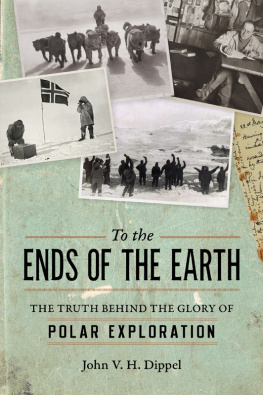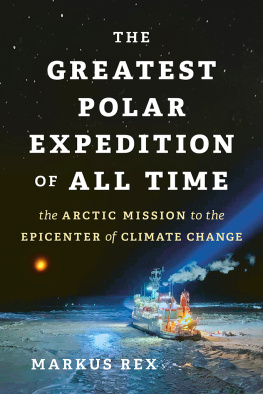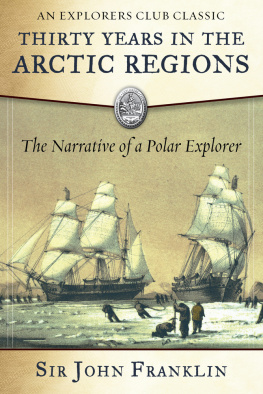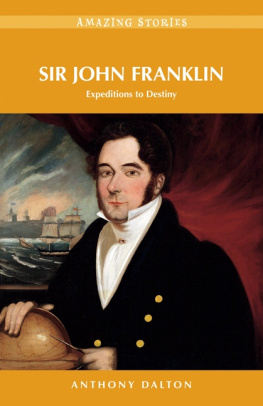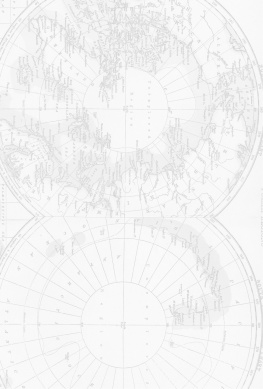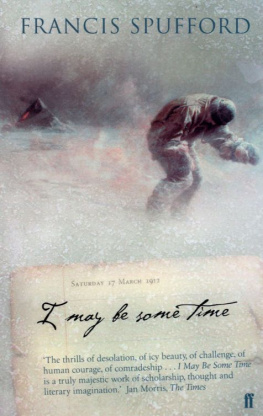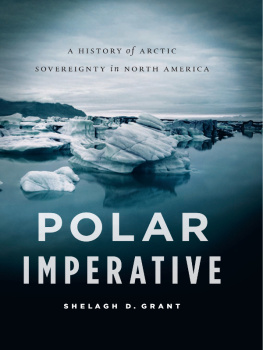
Researching a book on polar explorers is another kind of expeditiona long, hard slog through archives and libraries instead of around ice floes and across expanses of windswept snow. While this journey of mine has been far less perilous and far more comfortable, it has had its own share of challenges, which might have proved more daunting without the help I received along the way. I have been fortunate in receiving gracious guidance and good tips from a number of librarians and archivists in tracking down important books and documents I might otherwise have missed. In particular, I would like to thank Naomi Boneham, archivist at the Scott Polar Research Institute in Cambridge, England; Lacey Flint, archivist and curator of Research Collections at the Explorers Club in New York City; Susan Kaplan, director of the Peary-MacMillan Arctic Museum and the Arctic Studies Center at Bowdoin College; Morgan Swan, outreach librarian at the Rauner Library, Dartmouth College; staff at the Archival Center of the Newburyport (Massachusetts) Public Library; and librarians at the American Philosophical Society Library in Philadelphia, as well as the Rare Book and Manuscript Library of Columbia University.
In addition, I would like to thank Beau Riffenburgh, for advice and encouragement along the way; Steven Mitchell and his production staff at Prometheus Books, for shepherding my manuscript into its present form; and my agent, Eric Myers, for being daring enough to take on this work and patient enough to see it through to publication.
Salisbury, Connecticut
March 2018
ALSO BY JOHN V. H. DIPPEL
War and Sex: A Brief History of Men's Urge for Battle
Author's note: All temperatures in this book are in Fahrenheit.

The steamship bearing the body of thirty-six-year-old Elisha Kent Kane arrived in New Orleans on February 23, 1857, after having been seen off in Havanawhere he had succumbed to a long-weakened heartby a solemn procession of some eight hundred Cubans, Americans, and other foreigners, led by the governor of the island. In the Louisiana port, the ship was met by a host of dignitaries, and the coffin transferred under military escort to the city hall, where it lay in state before being carried by twelve pallbearers, accompanied by members of the Masonic Order, the Sons of St. George, various civic organizations, diplomats, and elected officials, past a hushed throng of some six thousand persons, to another waiting vessel for the long and winding journey up the Mississippi and then the Ohio and on from there by train to its final stop in Philadelphiaan odyssey lasting four weeks and passing through thirteen states, making it the largest and most elaborate funeral procession the country had thus far witnessed.
Along this route whenever it was possible the attempt was made by the people to give expression to the respect which the lofty character and ennobling services of the deceased had excited.
After being taken by rail to Ohio's state capital, Columbus, where so many mourners attempted to cram inside the senate chamber that half of them had to be turned way, Kane's body continued its way by train and boat eastward, on to Philadelphia. During its stopover in Baltimore, the streets were walled with people, whilst windows, balconies and rooftops were occupied by spectators in the largest public grieving in the city's history. Early on the morning of March 12, the day the funeral train arrived in his hometown, the streets were oddly quiet, flags hung at half-mast and black bunting adorned shop fronts and windowsills. Before noon the crowd outside Independence Hall had massed so densely that late arrivals could not get anywhere near the doors. They had to crane their necks to catch a glimpse of the entourage bearing Kane's flag-draped casket as it moved slowly atop a black-domed funeral car, drawn by six black horses, toward the soaring Corinthian columns of the Second Presbyterian Church and the nearby cemetery that was to be his final resting place. The eulogy was delivered before a hushed gathering by a fellow Mason from New York, E. W. Andrews, who spoke for over an hour, recounting the legendary feats of moral courage, scientific discovery, and sheer daring that had distinguished Kane's short but extraordinary lifefrom descending by rope into the crater of an active volcano in the Philippines, to saving the life of a Mexican general, to braving the subfreezing temperatures of the Arctic in search of Sir John Franklin and his men, to discovering the long-dreamed-of Open Polar Sea; Andrews paid fulsome homage to Kane's physical and mental energya capacity for labora power of endurancea resoluteness of purpose and an iron will, such as the stoutest and strongest, the Goliaths of earth, have rarely shown.
Not until the death of Abraham Lincoln eight years later would there be another such national outpouring of grief. Without exaggeration, it could be said that America had lost one of its most illustrious and most admired sonsa man whose deeds and character epitomized all that the country aspired to be. But who was this young doctor from Philadelphia, of diminutive stature and frail constitution, and why had his life and death touched millions so deeply? And why is he all but forgotten today? To answer these questions, one has to go back to the era that produced Kane and understand what it longed for in its heroes.
By the middle of the nineteenth century, the United States was like a giddy teenager going through an awkward growth spurt. Over the previous decade its population had swelled by nearly 36 percent, reaching twenty-three million. The growth of factories in New England was spurring a transition from agriculture to manufacturing, with both sectors now producing roughly the same amount of income. In terms of wealth, the new nation was rapidly closing the gap with major European powers like England and Germany. Geographically, the United States had expanded westward all the way to the Pacific, gobbling up huge territories that added over a million square miles to its dominionmore than the total area of Western Europe, including Scandinaviathus fulfilling its Manifest Destiny. But, despite all these material gains, America remained internally divided, insecure, and uncertain about its place in the world. Long-simmering tensions over slavery were coming to a head, with newly acquired Western territories turning into battlegrounds for deciding the nation's racial makeup. Whether or not the nation could remain united was now an open question: most people still used the plural form in referring to their country, as in The United States were developing rapidly.to be resolved and there was little agreement about how to go about building the future.
The United States was by no means alone in achieving tremendous domestic progress and economic growth while, at the same time, being beset by political and international conflicts. In countries like England, France, Denmark, Holland, and Germany, industrialization had widened the gap between rich and poor and created resentment and demands for reform. In 1848, revolutions occurred in several European states, with two monarchies being overthrown and serfs freed in Austro-Hungary. The Congress of Vienna (1814) had created a durable framework for order and peace in the aftermath of the Napoleonic wars, but national rivalries and territorial ambitions persisted. As so often happens, beleaguered and unpopular governments looked for ways to divert unhappy subjects from challenging their authority by cultivating patriotism and national pride. Overseas exploration and colonization served this need well. Planting the flag on distant shores attested to a country's collective will, prowess, and courage. Foreign conquest gave military forces a chance to hone their skills and display their might. Far-flung empires raised a nation's profile and made its people feel superior. Surplus populationunfortunates left out of the Industrial Revolutioncould be siphoned off to these faraway lands to reduce unemployment and unrest at home. Concomitantly, undeveloped corners of the world promised new raw materials, trade partners, and investment prospects. In addition, bringing civilization to less advanced peoples fulfilled a moral imperative to enlighten less fortunate peoples and help them advance. All this could be accomplished without risking the kind of devastating internecine war that had ravaged the Continent during the century's early decades. Thus, starting with England's opium wars in China in the 1830s, a New Imperialism informed the foreign policies of many European countries. In intent as well as in consequence, this ideology mirrored the expansionist impulse that was propelling frontiersmen, farmers, and cavalry troops over the Rocky Mountains.
Next page
